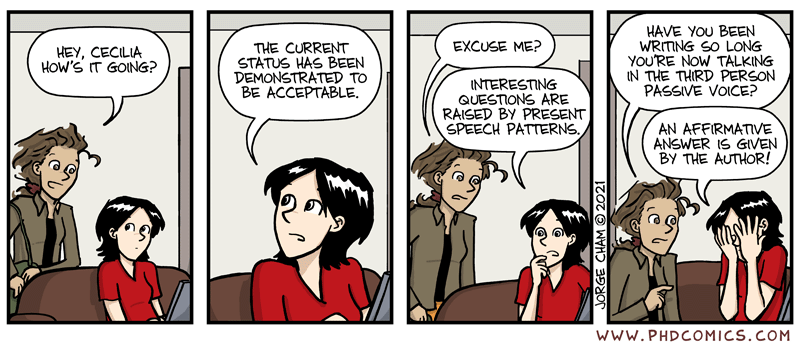A Good Example of Bad Writing
The clue is at the top of the fourth panel.

As you know if you read this site much, you should avoid passive voice like the plague! (I almost wrote “Passive voice should be avoided.” Shame on me.) And using the third person makes it worse!
Subscribe to this blog's RSS feed
To Be or Not To Be
This post describes something useful about ordinary writing, not about Shakespeare.
First, read the comic, first panel.
Notice that you could have put “to be” between “turn out” and “so.” The sentence makes perfect sense the way she wrote it, though, doesn’t it?
Lots of languages leave out forms of “to be” most of the time. I remember hearing an interview in All Things Considered several decades ago. The guy had resolved to stop using any form of “to be.” And I’ve heard occasional remarks from teacher types who pointed out that you can replace “to be” with a more meaningful verb almost all the time, and doing so improves your writing. (I should add that using “to be” often puts a verb into the passive voice, which I already preach against.)
Give it a try: Cut down on using “to be.” It makes your writing livelier.
PS—in the second panel, for example, she could have said “Let’s go offline for the day.”
Follow-on to the Previous Post
The previous post was mainly about the verbs lay and lie, but it made a brief reference to the transitive-intransitive dichotomy. Here’s an article that got it right, then got it wrong. Should help make the distinction clear.
First the headline, which is correct:
MSDN Magazine will publish its last issue, ending a Microsoft developer era
https://arstechnica.com/gadgets/2019/08/microsofts-msdn-magazine-for-developers-will-end-its-decades-long-run/#p3
And the article’s first sentence (it’s the subhead), which is incorrect:
The final issue of the print magazine will publish this November.
“Publish” is transitive! You always publish something! In this case they publish an issue.
- So to make that second sentence correct, they need to use either the passive (ick) by saying it will be published;
- Or they need to give the verb a direct object, saying something like they will publish the last issue this November.
- Or they could use an intransitive verb, saying the magazine will end in November.
See the difference? Good. Now you’re a grammar expert. For practice, go look for a few more examples.
I like pictures in these posts, so here’s a picture of the product that the magazine was all about.

This post first appeared on The Writing Rag.
A Tip When You Write an Introduction
I’m a technical writer. A lot of SMEs have handed me drafts of their documentation to “work my magic” on. If their document has an introduction (usually a paragraph right under the first heading) I frequently have to fix the first sentence. They like to write something like this:
This document is intended to describe/show/give the instructions for operating XYZ software/machine/process.
(the words with slashes are variables)
Folks, things like instructions are tangible. Either they’re in the document or they aren’t.
Get rid of that “intended”! The document either describes/shows/gives the content or it doesn’t!
Today I ran into a document that both uses “intended” and doesn’t use “intended” correctly !
My introduction is intended to provide a motivation for what follows. The first four chapters discuss the most plentiful objects in the night sky—the stars.
See? He intends to motivate you, and actually discusses the topic. Good for him! Go thou and do likewise!
The document deserves a bit more than a line of citation. The University of Chicago Press has a program where they let you download one of their books (of their choosing) for free every month. I downloaded this book, How We See the Sky: A Naked-Eye Tour of Day and Night by Thomas Hockey in March of 2019. Here’s a link to their program. If you like to read serious books online, take a look.
www.press.uchicago.edu/books/freeEbook.html
PS—He could have used the active instead of passive (“intends to provide” instead of “is intended to provide”), but hey, it’s academic. They always use the passive, don’t they?
A Grammar Joke and a Rule
Here’s the comic:
(There ain’t no such thing as passive aggressive, but you know that.)
Here’s the rule: Try never to use the passive. No joke!

